Why I’m Boycotting the Farmers Market
Though the state signed an MOU promising to snow plow the bike trail leading to the Winter Farmers Market, they aren't doing it.
I may not have a green thumb, but even I know most farmers markets have been closed since the end of the fall harvest. Still, there is the Milwaukee County Winter Farmers Market, which I biked to religiously every Saturday morning last year. This farmers market had a surprising amount of fresh produce all winter last year when it was at the Tommy Thompson Center at State Fair Park. It was a real treat to shop for fresh, local greens, apples, potatoes, onions, herbs and proteins every week, well past the time when I am typically scraping the bottom of my personal root cellar.
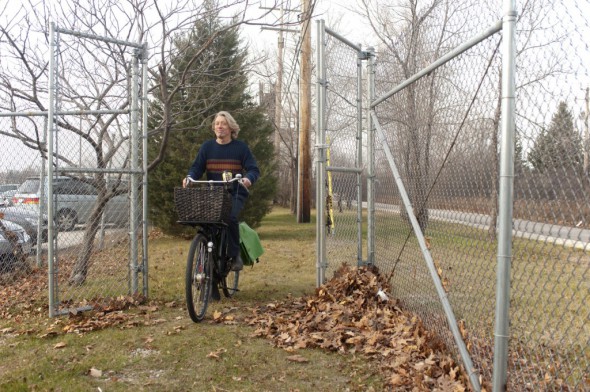
The first week of December last year: Me and Oma riding through the gate from the Hank Aaron State Trail to the winter farmers market at the Tommy Thompson Center at State Fair Park.
This year, they moved the winter market to the Domes at Mitchell Park. My friends and family all know I love Milwaukee’s famous Domes, so you’d think I would be even more inclined to go this winter. But here’s the problem: This summer the state built a bunch of sweet new trails and bridges in the Three Bridges State Park to connect the Hank Aaron State Trail with Mitchell Park. And yes, I love the new trails and they make an ideal route to get to the market … but they are not plowed!
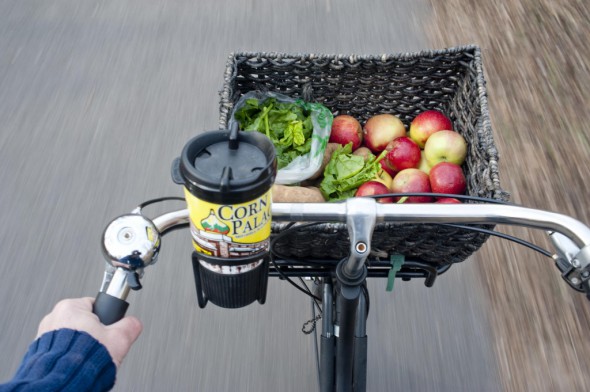
If we had another mild early winter like last year, I’d still be shopping at the winter farmers market and enjoying the route, fresh local produce and new location at the Domes even more.
The City of Milwaukee does a really good job clearing the bridges on the Hank Aaron State Trail, because they agreed to take ownership of them in order to get the trail constructed, but that leaves the rest of the trail, which is supposed to be maintained by the state , covered with snow, despite a signed memorandum of understanding that they would agree to clear maintain the trail.
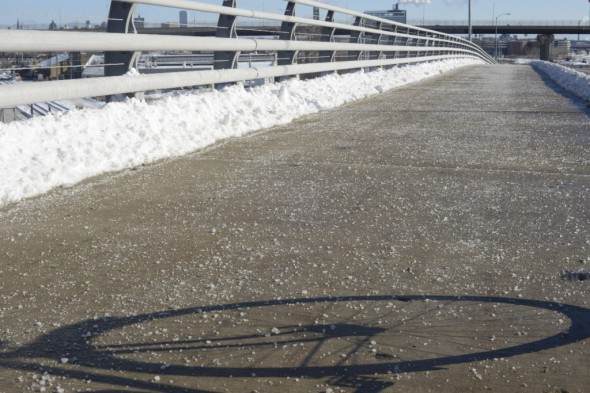
This view of the Hank Aaron State Trail looks east from 32nd Street and is part of a bridge maintained by the City of Milwaukee Dept. of Public Works bridge maintenance crews. As you can see, they do a killer job keeping the trail clear.
I’m not blaming the Wisconsin Dept. of Natural Resources’ regional trail manager. She was not given any equipment, staff or budget to clear the trail of snow or ice. I also understand that the senior staff at the WDNR have been forced to make due with ever-shrinking budgets for years, so I don’t blame them either. Hey, I give them props for building the awesome trail and park in the first place.
Based on the last couple state elections, it appears the majority of my fellow voters in Wisconsin chose to elect leaders to Madison with a mandate to spend pretty much all of our transportation dollars on bigger, wider highways, despite years of declining traffic counts. It seems those leaders feel their constituents don’t want even a relatively small amount of money spent on winter maintenance for trails with increasing user counts.
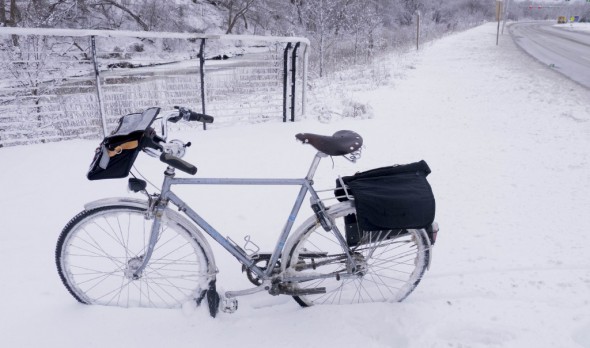
The snow is so deep on the unplowed sections of the Hank Aaron State Trail that my heavy commuter bike can stand up without the kickstand down.
In fact, last winter, the trail counter at the Menomonee Valley Passage recorded 6,659 users from December 4, 2012 though February 7, 2013, even though the trail was not being plowed. As I mentioned above, we had a mild early winter, but who knows how many people would have continued to use the trail if it was consistently cleared of snow?
Regular readers will remember I recently built a rear rack for my Schlick Northpaw Fatbike. With the aggressive tread pattern on the Surly Nate tires I am currently rolling, I know I could get to the market via the trail if I really wanted to. Alternatively I could take City of Milwaukee surface streets to the Domes, quite a few of which have bike lanes. The problem is every time I did it, it would really bug me that we built an even better route on great new trails through a fabulous new park connected by wonderful new bridges, and we don’t plow them.
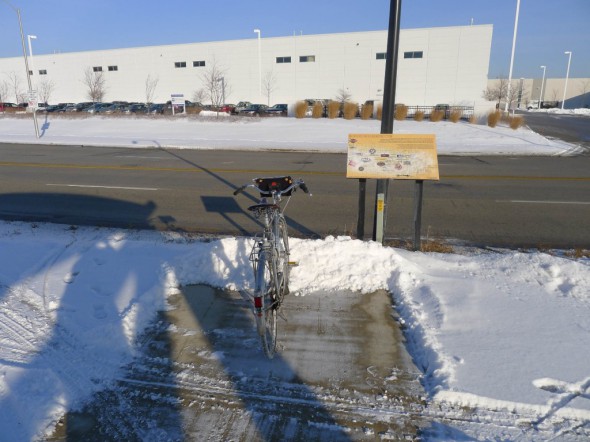
Meanwhile, just a few feet away, the City of Milwaukee DPW keep the trail at the end of the bridge by the Menomonee Valley Passage clear of snow, but stops plowing where the state section of trail begins. You can hardly blame the city for not plowing the State’s trail when their state shared revenue keeps getting cut every year.
Meanwhile, just a few feet away, the City of Milwaukee DPW keep the trail at the end of the bridge by the Menomonee Valley Passage clear of snow, but stops plowing where the state section of trail begins. You can hardly blame Milwaukee for not plowing the rest of the state’s trail when their state shared revenue funds keep getting cut every year.
Yes, that is the definition of sour grapes. I am depriving myself of access to great locally grown food because I can’t just let it go. If there are any zen masters or psychologists out there reading this, I’d be happy to get your advice about how to try to forget about the disappointing allocation of my tax dollars and enjoy the routes that are available to me. On the other hand, maybe part of the reason I have chosen a career as a bicycle advocate is that stuff like that does bother me so much.
I guess for now, I’ll channel that disappointment and keep looking for some way to get the Hank Aaron trail plowed.
This article was originally published by the Bicycle Federation of Wisconsin.
Bike Czar
-
Join a Bike Ride Under the Polish Moon
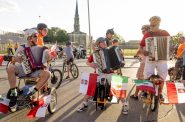 Jun 1st, 2018 by Dave Schlabowske
Jun 1st, 2018 by Dave Schlabowske
-
9 Reasons to Join National Bike Challenge
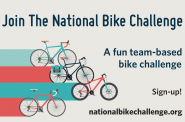 May 4th, 2018 by Dave Schlabowske
May 4th, 2018 by Dave Schlabowske
-
Biking Through the Mindoro Cut
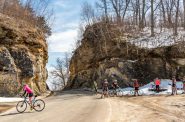 Apr 27th, 2018 by Dave Schlabowske
Apr 27th, 2018 by Dave Schlabowske





















I advocate for a statewide mandatory Bike registration fee or small tax on bike purchases. These funds would be completely separate from the transportation fund and then there’s no excuse for why it’s not being used to build and maintain biking infrastructure. It’s neigh time we find a way to create a source of funding where we don’t have to worry about begging for it from other government entities nor worrying about it being taken away and used for non-biking purposes.
On a side note though Dave, the farmers market has no control over it. Yes you’re mainly doing yourself a disservice by missing out on a great chance to partake in a local institution… but if everyone did that we wouldn’t have a winters farmer’s market at all.
Andy, I would agree with your proposal if the state also had a mandatory Car & Truck registration fee or small tax on car / truck purchases. These funds would be completely separate; used only & without other tax/fee money, to provide road infrastructure for Cars & Trucks.
I think my idea would be a great way to lower the property & income taxes, as the state & local governments wouldn’t have to hide road fees in those other ways of collecting revenue.
@Tim I’m pretty sure there is already a registration fee on cars and such, but I understand your point: the auto fund is subsidized all sorts of ways (For example, often lately the General fund both in Wisconsin and at the federal level is actually putting money in to the road funds). And I’d support just leaving the sales tax that is already collected on bike purchases for bike stuff and if I remember correctly there would actually be a larger funding source for bikes than there is today. If it could be done without too much complexity.
You’re not happy with the state government, so you’re boycotting the county-run event? Seems a bit misplaced…
I’m just trying to imagine the outrage if large chunks of state highway or interstate went unplowed for an entire winter. I’m sure people would already be circulating the recall petitions. This is WisDOT’s nice way of telling us all that if you don’t drive, you don’t matter.
For what it’s worth, the unplowed sections of the HAST make for great x-country skiing. Not to excuse the fact that the trail was meant for bike and pedestrians, but it was pretty serene the day after Christmas to check out some skis from the UEC and explore our urban wonderland in a new way.
Well the majority of the transportation fund IS funded by registration fees, gas tax, etc. Yes there’s been some bolstering of the fund from the General fund lately, but that only begins to offset how much was taken out during previous administrations. The raiding of the fund is what helped create the situation where we have to borrow so much to begin with. Not to mention, even if you don’t drive, roads are a necessity… you need them for buses, trucks, ambulances, police, etc. Bike trails are a luxury. One I’d happily pay for though.
This shouldn’t be a car vs bike discussion. I think we can get a lot more infrastructure built and maintained if we had a dedicated funding source. This is the best way, in my opinion, to make it happen. Waukesha county charges for the use of it’s trails and that has worked… several cities have tried putting a tax or fee on new bike purchases and they’ve been highly successful. It is not unreasonable to have our own conversation on where we can get the funds without muddying the waters by talking about cars. That’ll just make everything a lot more complicated and a lot more politicized.
I biked to the Domes yesterday and took Pierce St. – Bruce St. Tolerable, but I would much have preferred to take the trail.
Andy, if you didn’t know, majority means more than 50%. That’s a very low threshold, how would my bank react if I told them I promise to pay a majority of my mortgage?
Next, the gas tax is collected by travel on all roads and only spent on few roads. The rest of the money comes from property, sales & income taxes. It’s not a matter of one-time transfers to/from the general fund, it’s a matter that those roads don’t directly pay for themselves. Will you allow yourself to admit that?
There’s a cost to everything and it’s foolish to think there aren’t competing needs out there. I bring up the car/bicycle proposal because why does it make so much sense for bicycles but not cars? Why is another mode of transportation different?
Get a life….drive a car, walk, take a cab or a bus. Why should my taxes pay to plow snow off a bike trail when common sense tells you that bikes are for non winter times of the year. Why do you think that 95 percent should have to pay for the oddball 5 percent?
@jim hootie. For the same reason my tax dollars are used for emergency services on highways when common sense tells you to stay off the road when there’s an icey slushy mix.
wow. talk about first world problems. you might be the most pathetic human ever!
The basis for this discussion should be how our tax revenues are collected, and how they are allocated. The pressure coming from Madison (particularly in the last budget cycle) was to exclude, by law, or by reducing revenues, anything except road work that mainly served private transportation and trucks. If we want a dedicated bicycle fund, we will probably get (and regret) it from this government. Welcome to our bake sales!
Better that we should approach Madison as a resolute coalition and demand more equity in all transportation allocations: local roads, state roads, repair and build, sidewalks, walking, bicycling, transit, private, air, and trucks. We share the same need; smart politics will not divide us and conquer them.
David Riemer did the research and I drew the pictures. Here is tax money, collected and allocated on transportation services:
http://www.milwaukeerenaissance.com/BillSell/RoadCostsWhoPays
These numbers are four years old. I expect the margins are tighter since the new government took over Madison.
I think one of the reasons that funding for biking infrastructure never gets real mainstream support is columns like this. Most people reading this are likely rolling their eyes the same way that I am. Now before you write me off as a person who hates bikers consider this:
The Company I own has a recreational bike team that takes part in several charity events. When it was time to get an office we narrowed our choices down to Summit Place in West Allis and The Pedal Milwaukee building on Pierce Street mainly because of both buildings are relatively easy for our staff to bike to if they’d like. Most of us do quite a bit in the months where the weather is decent.
So I’m more of a bike nut then most and even I’m not thinking we should be allocating a ton of resources to plowing trails that will be used by a staggeringly low number of people. To me that would be wasting money that could be best used elsewhere. For example widening some of the trails on the Oak Leaf so one doesn’t always have to dodge people walking dogs or people jogging 3 across.
To gather more support you have to target the people in the mainstream. Some of these improvements on the trails will lead to more people riding a bike. That’s a good thing even if 99% of us aren’t going to be riding every day of the year. If you make biking seem like an elitist thing practiced by a few people on the lunatic fringe you’ll never mover the meter.
So go ahead and boycott an event you like going to. Most people will think you’re insane and the symbolic stance will do nothing.
Or you could ride your bike in the street. Isn’t that what all your other articles are about?
Hi Mike,
I completely agree we need to spend money for bicycle infrastructure wisely. There are definitely many significant improvements that need to be made, perhaps widening the more heavily used sections of the Oak Leaf are one. But spending $5,000 to plow the Hank Aaron trail we spent millions of dollars building seems to me like a very wise use of limited funds and since the section of the trail I am talking about plowing functions as a sidewalk along Canal Street and provides access to major employers and heavily used parks, like Mitchell Park, that small investment in winter maintenance leverages further leverages the millions we already spent on the trails, the park, the redevelopment of the Menononee Valley, etc.
As for a staggeringly low number of people, as I mentioned, that section of trail still gets thousands of users in the winter, even though it doesn’t get plowed. And lots of municipalities plow roads that only have a few cars a day on them. There are hundreds or maybe thousands, of cul-de-sacs in suburban style neighborhoods, that only have a handful of houses on them, yet they get plowed every snowfall and those people who live there pay the same snow and ice removal fee as those who live on log streets with lots of homes. Certainly fewer use the trail in the winter than warmer months, but that is the case for bicycling everywhere, even where winter cycling is much more popular, like like Madison or Minneapolis. Those cities have very significant numbers of people riding all year, the reason is they maintain the bikeways better.
Finally, yes, many people think I am insane, but I’m not boycotting the market because I think if I don’t go, the trails will be plowed. I’m doing it because it bugs me so much that we don’t maintain these significant investments we made to encourage people to ride bicycles. I am working to get the trails plowed in a more productive way, though meetings, emails and phone calls.
Thanks for reading, writing and riding.
Stan,
No, I don’t just advocate for people to ride bicycles in the street. I advocate for a balanced transportation system that includes on-street routes as well as trails. As I mentioned in the post, I know I could ride streets from my home to the market at the Mitchell Park Domes, but the best bike route is the trail, and we spent millions on it, so why not spend a few thousand to clear it of snow in the winter?
Jim Hootie,
I pay the same snow and ice removal fee as my neighbors. I pay taxes that subsidize free on-street parking all over Milwaukee, all of which gets plowed and salted. My income taxes pay for wider freeways despite decreasing numbers of people using them. With our current system, we all pay for lots of things we might not use, but benefit others. I would be completely open to the idea that I no longer had to pay for things I don’t use and just pay for what I do use, but that is not the question here.
Hey Michael, yeah, I take those same roads to the office most days. As I mention in the post, there are on-street routes to get to the Domes, but the best route is not maintained in the winter.
Garrick,
As I mentioned in the blog post, I understand that my reaction is not rational. I am working rationally with all the parties involved to get the trail plowed in the future. And just to be clear, state trails are WNDR facilities, not WisDOT facilities, even though WisDOT did oversee the project to get it built. Your point is well taken though. We continue to build bigger, wider roads despite WisDOT’s own traffic counts that show many freeways have had declining traffic since before the recession, and we still maintain all those lanes in the winter.
Andy, I and pretty much everyone else who works on these issues agrees our transportation funding system is not sustainable. We need new sources of revenue for roads, even if we built fewer of them, and our priorities seem out of sync with how people want to get from point a to b. More people want transit, biking and walking, but we have been cutting those funds because we are so short on money for the most expensive form of transportation, motor vehicles.
We have to solve the bigger funding problem before things like bikes and transit will get their fair share. Sec. Gottlieb knows this, Governor Walker knows this, the road builders know this, and transit and bicycle folks know this. Does that mean there is a politically acceptable solution? Not really, but I remain hopeful.
Hey again Andy,
The Bike Fed has been open to discussions about new, dedicated funding sources to pay for bicycle infrastructure, even registration or sales taxes. The economics of it are a bit more complicated than it sounds, but it definitely would help politically to at least appear to ante up at the transportation funding game. The biggest problem is that automotive transportation is so heavily subsidized through all these hidden means people never think about. Take parking for example. I ride my bike to a store and lock to a bike rack that cost the store $150. I spend $100 on groceries. My neighbor drives a car to the same store and parks in a parking space that costs $5,000 to build. She buys the exact same groceries and also pays $100. We never felt like we were paying to park, but we did, the costs are just hidden in the mark-up of the groceries. My neighbor and I paid the same amount to park, even though it costs a lot more for her than me. I subsidize every trip my neighbor makes to the grocery store. Those sort of hidden costs will be very hard to remove.
To your side note, I know the good folks at Milwaukee County Winter Farmers market have little control over plowing on the trail but they could advocate the trail be plowed. Substitute “Winter Farmers Market” for “grocery store” in my analogy above, and you will see I subsidize other people’s ability to drive to the market with every purchase. They would never think of putting the market somewhere you couldn’t drive to, or somewhere that didn’t have a plowed parking lot. The big reason I am not going to the market on city streets, is to keep this issue alive for me so I work to get the trails better maintained in winter. I am working on that through more productive channels.
Dave,
Thanks for all the feedback to everyone’s comments. It is nice to interact with the blog writers.
My main rationale for dedicated funding separate from the transportation funding is because it is such a hotbed of political debate. By removing biking from the picture (at least in terms of dedicated infrastructure… I think there’s still an argument for having some bike funding in the trans. fund when this infrustructure is part of a road redesign for example) we take the politics out of it and make it easier to get the things we support.
But to rebut you grocery store example, I can turn that around and say how many Bicycles are chained to the rack vs how many cars park in a stall? Depending on the area, there may actually be enough cars parked in a stall during a year to make the per user cost lower then that measily 150 dollar rack. I have no data to back this up, but I can imagine that could happen.
Andy, I agree that it would help politically and to a smaller degree, financially, if there was another dedicated registration fee or sales tax, beyond the trail pass, for bicycling. Hard line bike advocates can’t get past the subsidies we already pay for motor vehicle transportation systems. They are many and varied, but driving has huge external hidden costs. Google the true cost of driving and lots of papers show up. Some are better than others. But we at the Bike Fed have heard from many of our members that they would be willing to pay more, despite current inequities. Having heard that, I and Exec. Dir. Dave Cieslewcz, have told Sec. Gottlieb, Gov. Walker and many legislators that people who ride bikes are willing to pay a bit more if the money goes to a dedicated fund.
I hate to quibble about money with a CPA, it is like arguing with a lawyer, but there are lots of studies out there that show how much it costs to build and maintain parking. The grand daddy of studies was done by Donald Shoup, the High Cost of Free Parking. If you don’t feel like reading all 800 pages of his book, this is a shorter reference:
John Dorsett (1998), “The Price Tag of Parking,” Urban Land, Urban Land Institute (www.uli.org), May 1998, pp. 66-70
Of course land cost is a big part of this equation, and varies greatly by location. Opportunity costs of lost revenue for other types of buildings that could be put on the space where a big, often partially empty parking lot is, should also be factored in. I typically see estimates of $200-$800 per year to maintain an urban surface parking lot.
In general, most studies that try to factor in all those hidden costs and returns on investment for various modes of transportation, show that driving a car is a net negative to society, and riding a bicycle is a net positive. Of course we need all modes. I’m not going to bike to Ashland to go deer hunting and my wife is not going to bike to Racine to ride a horse. We both bike to work, the store and to go our in our neighborhood though, and we just want our to be equitably treated when we do.
David,
When I was in Nicaragua, I volunteered at a community newspaper in Bluefields. When I was in Guatemala, I worked with the people who live in the garbage dump in Guatemala, City. When I was in Haiti, I worked on the election in Cite Soleil. Now I am in Milwaukee, so I work on first world problems, access to walkways and bikeways is one of them, but I have worked on needle exchange programs, taught first grade at an inner city school, worked elders in our native tribes, etc.
If you are emailing me from a refugee camp in the Central African Republic, I can understand why you might find my efforts to get the walkway cleared of snow in the winter on Milwaukee’s near south side trivial, but it isn’t really a good reason to call me names.
Dave, as a note on “the price tag of parking.” I’ve read parts of that report before, and I generally have a problem with it. Not really the report itself, but the way people use it to justify decisions around parking. When we talk opportunity costs, people who cite this study fail to account for the benefits of the parking and the costs associated with eliminating them. The report (at least from what I’ve read) doesn’t address this. For example, if a grocery store were to eliminate the parking, what would the cost of the lost revenue be because people don’t want to walk 2 blocks to the store?
In an ideal urban environment, people would make the walk or use alternative transportation… but reality is that most cities are not the ideal urban environment and Americans in general have a lower propensity to use these modes unless they are as convenient and/or cost effective as personal transportation.
Additionally, this report does a very good job of finding every possible cost they could find regarding parking. However, it does not (and was not designed to) look at every single benefit as well.
Economics has it’s own set of laws though and doesn’t really care what we think on Urban Milwaukee. If the opportunity cost is high enough, then something else will be built in it’s place. That is the reason we see very few surface lots in New York and Chicago… eventually the value (and thus opportunity cost) of the land is just too great to leave it as is. Lets be clear, anyone who understands economics knows that “free” is never really free.
Soooo…. Did I just get us on a tangent here? Sorry about that…
Dave,
When I say staggeringly low it’s because according the The Journal 350,000 cars go through the zoo interchange on a daily basis. So millions are going through it during the same time period that people are going through the trail in the months you describe.
Also, I get some people don’t like roads, but unless we go back to all trains to move goods, you do sort of need them to be up to date and such.
The bridge connecting The Hank Aaron state trail to the Mitchell Park Domes IS plowed. I saw that in person yesterday (1/25/2014). Connect south of Palermo’s Pizza on 3301 W. Canal Street.
See this map for details: http://www.hankaaronstatetrail.org/pdf/Hank%20Aaron%20State%20Trail%20Map.pdf